 What is an abscessed tooth
What is an abscessed tooth
It is an infection of the mouth that forms between the tooth and gum or even the root of the tooth caused by pus. This normally occurs when the soft tissue in the root canal is dead and it becomes inflamed.
What are symptoms of an abscessed tooth
To detect an abscessed tooth, one needs to be aware of the symptoms early enough to minimize the damage that can affect your whole oral health. The most common symptoms, however, are an ache in the bone around the tooth. You may experience a lot of pain when chewing because of the swollen gums. More symptoms include;
- Foul-smelling and tasting, salty fluid and pain relief in the mouth when the abscess ruptures
- General discomfort in the mouth
- If it is not treated as soon as possible, the pain becomes more excruciating
- Difficulty to breath or swallow
- Swollen glands in the neck
- Your tooth is more sensitive to hot or cold temperatures
- Swelling of the upper or lower jaw
- Persistent throbbing pain to the jawbone, neck, and ear
- Gums may be red and swollen
- Develop a random fever or abnormally high body temperature
- Open sore, on the side of your gums
Abscessed wisdom tooth symptoms
Wisdom teeth are normally associated with many negative outcomes, tooth damage, cysts and infection that lead to a wisdom tooth abscess. If you still have wisdom teeth, you should be aware of the following symptoms;
- Bad odor
- Swollen gums
- Fever
- Nausea/Vomiting
- Swelling of the face or neck
- Discharge of pus from the area
- Sensitive to extreme temperatures
- Soreness in the gum that will not heal
- Persistent toothache
If a patient experiences any of these symptoms, they need to have the tooth removed and possibly an incision to drain the abscess and antibiotics will be prescribed.
What are common causes of an abscessed tooth
An abscessed tooth normally is caused by tooth decay that has formed over time. When bacteria enter through a chipped or cracked tooth and spreads down to the root, causing swelling and inflammation at the root of the tooth.
Gum disease, gingivitis are some of the main causes of tooth abscess especially if left untreated for a long period of time, the infection begins to spread. An example, a tooth that is broken will cause openings making bacteria enter and infect the center of the tooth.
Abscess Tooth Diagnosis
An abscessed tooth is examined by your emergency dentist. If you notice any of the above symptoms mentioned above, your dentist may perform some medical procedures;
Tap on your teeth, a tooth that has an abscess is sensitive to touch and also pressure.
Perform or recommend an x-ray. This will help identify an abscess and also how far the infection has spread causing abscesses in other areas.
A CT Scan. If the infection has spread, this will be recommended by the dentist to assess the extent of the infection
Abscess Tooth Treatment
Once your dentist diagnoses you with a tooth abscess, to get rid of the infection he/she may;
Make an incision to drain the abscess, this is to allow the pus to drain out and then clean or wash the area with saline. A small rubber is placed to keep the area open to drain the pus as the swelling decreases.
A root canal is performed to eliminate the infection. The dentist drills the tooth removes the diseased tooth and drains the abscess. He/she then fills the tooth’s pulp, the tooth is then crowned to make it stronger.
Remove/Pull the affected tooth if it can’t be saved.
Antibiotics may be prescribed if the infection has spread to nearby teeth to stop it from spreading further. The dentist may also recommend antibiotics if you have a weak immune system.
Abscess Tooth Medications
Medication that is commonly used is over the counter painkillers i.e. the Ibuprofen (Advil or Motrin) or paracetamol, amoxicillin, Flagyl, Amoxil, etc.
Self-Care
By doing this daily, it might help prevent tooth abscess;
• Daily flossing
• Brushing your teeth twice or even more a day
• By eating healthy and trying as much as possible to avoid sugary stuff.
If abscess teeth can’t be prevented other home remedies can be considered even though they are short term. Warm saltwater and over the counter medicines can help soothe the pain and even cleanse the infection.
Specialists
The treatment is usually determined by the dentist who will treat the abscessed tooth. A general dentist normally can manage an abscessed tooth by clearing an infection, performing root canal or extraction of a tooth. Alternatively, an endodontist can treat and perform the root canal procedure. An oral surgeon can also extract the tooth if the loss cannot be prevented and if the case is severe. For children, a pediatric dentist can provide the care needed for baby teeth.
Can an abscessed tooth be saved
It is very possible, so yes it can be saved. If the tooth is yet to be infected from the abscess it can be removed and try to be saved through a root canal treatment. If it is impossible to be saved because of the damage caused by the infection, it will have to be extracted.
Dangers of an untreated oral abscess tooth
If you leave an abscessed tooth untreated, it can affect your health unless it is treated as soon as possible. Choosing to ignore as an unwise decision and potentially life-threatening leading to;
• Infection of the surrounding bone. If the infection spreads to the jaw bone, surgical removal may be required to stop it from spreading further, or in cases where the extreme is not required, the infection will cause weakening of the bone structures making it difficult for the jaw to support the teeth.
• Tooth Loss. When abscessed tooth persists and no treatment is given therapy may not be possible as the tooth will be weakened and the risk of spreading the infection would be higher.
• The infection would spread to the sinuses and oral soft tissues. Roots of several upper teeth extend to the sinus area an abscess can lead to a very painful sinus infection.
• Abscess of the brain. Infection from a dental abscess can enter the brain and this might be hard to treat causing a patient to go into a coma.
• Inflammation of the body that can lead to stroke and cardiovascular disease.
• It can cause a heart condition endocarditis by spreading to the heart.
• On an expectant mother, it will interfere with the development of the fetus in the womb causing low birth weight and premature birth.
How to prevent an abscessed tooth
An abscessed tooth can be prevented by taking these steps;
• Going for regular check-ups and cleanings
• Cutting down on sugary stuff between meals
• Making dentist appointments as soon as possible if you have any broken tooth
• Flossing daily to reach sports that your toothbrush can’t reach
• Brushing your teeth twice or more daily
When to See an Abscess Tooth Emergency Dentist
As soon as you start to experience some symptoms of an abscessed tooth-like severe dental pain, nausea, swollen gums, redness of the gums, difficulty to breathe or swallow or fever it is important to contact a dentist as soon as possible.
When seeking treatment for an abscessed tooth the first thing we will do is to drain the pus surrounding the infected tooth. Likely an antibiotic will be prescribed to help fight the infection because sometimes the patient needs to start antibiotics before the dentist drains the abscess.
Tooth Abscess Home Remedy
Generally, home remedies are not advised when it comes to dealing with abscessed teeth. They are temporarily used to help deal with the pain as you wait to seek professional help.
Oral rinse with saltwater
Put a tablespoon of salt in a half glass of warm water and rinse your mouth focusing on the infected area. This helps kill the bacteria hence the healing process begins.
Oil Pulling
This is an effective home remedy to help get rid of tooth abscess pain and infection. You put the oil in your mouth and swish it around the teeth and gums, this will make the bacteria trapped and once you spit it out it will be removed from your oral cavity.
Herbal tea bags
This is another great way to relieve some pain by simply removing it from the cup and hold it gently on the affected area.
Over-the-counter medicines
Ibuprofen might come in handy this time, you can ask the pharmacist for a pain reliever that helps reduce inflammation.
Apple cider vinegar
It is anti-inflammatory and disinfectant properties will help keep pain under control and inflammation.
Flossing
If the pain and swelling are not severe, you can gently try flossing the area that is infected. As long as the infection isn’t too severe to cause pain it shouldn’t hurt and it will help. Removing any food particles will help the affected area not to be irritated and it won’t be inflamed.
Using hydrogen peroxide with a homemade mouthwash
Hydrogen peroxide is well known for antiseptic and antibacterial properties that are ideal for treating an abscessed tooth. Use it to rinse your mouth after brushing and flossing and make sure not to swallow as it has side effects.

